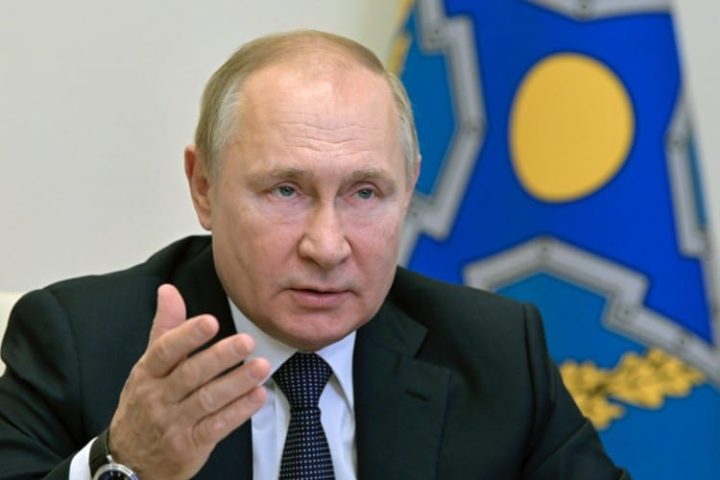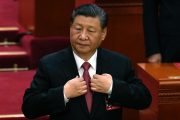
Kazakh President Kassym-Jomart Tokayev and Russian President Vladimir Putin claimed victory on Monday in quelling what they described as a “coup d’etat” and “color revolution” in Kazakhstan, which had been shaken by violence that ostensibly began with protests over high fuel prices.
In a speech made during an online meeting of the Russian-led Collective Security Treaty Organization (CSTO), Tokayev said that order had been restored in Kazakhstan, though the hunt for “terrorists” was continuing.
“Under the guise of spontaneous protests, a wave of unrest broke out… It became clear that the main goal was to undermine the constitutional order and to seize power. We are talking about an attempted coup d’etat,” he said.
The fuel demonstrations that started just over a week ago quickly took a political turn, evolving into a wide protest against not only Tokayev’s government, but against his predecessor, 81-year-old Nursultan Nazarbay — the country’s first president after the fall of the Soviet Union. Nazarbayev remains influential in the country even after stepping down from the presidency and was serving as head of a powerful security council prior to the unrest.
“The main blow was directed against (the city of) Almaty. The fall of this city would have paved the way for a takeover of the densely populated south and then the whole country,” Tokayev said. “Then they planned to seize the capital.”
He also contended that a major “counter-terrorism” operation would soon end, along with a CSTO mission that he claimed numbered 2,030 troops and 250 pieces of military hardware.
The CSTO is an intergovernmental military alliance that consists of various post-Soviet states: Russia, Armenia, Belarus, Kazakhstan, Kyrgyzstan, and Tajikistan.
Reuters notes:
Tokayev defended his decision to invite Russian-led troops into the country and said that doubts over the legitimacy of that mission stemmed from a lack of information.
Kazakhstan would soon provide proof to the international community about what had happened, he said.Sixteen members of the security forces were killed, while the number of civilian casualties is still being checked, he said.
Putin celebrated his own role in crushing what he described as a foreign-backed terrorist uprising. He also promised that a security block headed by Moscow would prevent “color revolutions” from overtaking its ally nations.
The Russian president said Russia-led forces were securing key infrastructure to “normalize the situation” and help “restore order to the country.” He blamed the events in Kazakhstan on international meddling.
“Of course, we understand that the events in Kazakhstan aren’t the first and will be far from the last attempt to interfere in the internal affairs of our states,” Putin said.
The Financial Times reports:
[Putin] claimed that protesters had used “Maidan technologies”, a reference to a 2014 uprising that toppled a pro-Russian president in Ukraine, and cited other pro-democracy movements that ousted Moscow-aligned rulers in Georgia, Ukraine and Kyrgyzstan in the 2000s.
“We won’t let anyone destabilise the situation in our home and won’t allow the so-called colour revolution scenario to play out,” Putin said.
According to Putin, “destructive internal and external forces” took advantage of the fuel protests to deploy “well-organised groups of militants under their control” that had “obviously trained at terrorist camps abroad.” These revolutionary forces allegedly used the Internet and social media, which Kasazhstan shut off for prolonged periods last week, to create a pretext for “terrorist attacks.”
In response to the protests, the Kazakh president’s entire cabinet resigned.
Per Tokayev, the revolutionaries were “beating and killing policemen and young soldiers, [setting] fire [to] administrative buildings, looting private premises and shops, secular citizens, raping young women.”
Reuters noted that “an Instagram live stream by a Kazakh blogger showed a fire blazing in the office of the mayor of the main city, Almaty, with apparent gunshots audible nearby. Videos posted online also showed the nearby prosecutor’s office burning.”
Mainstream media outlets such as the Washington Post have sided with the “protesters” in the Kazakh crisis, characterizing the Russian intervention as a means to further Putin’s “sphere of influence.”
Kazakhstan, then, has become the site of a conflict between two competing narratives. Were those pushing for the ousting of the current government pro-freedom demonstrators, or was it, in fact, an internationally-backed “color revolution” and coup attempt as Tokayev and Putin claim?




